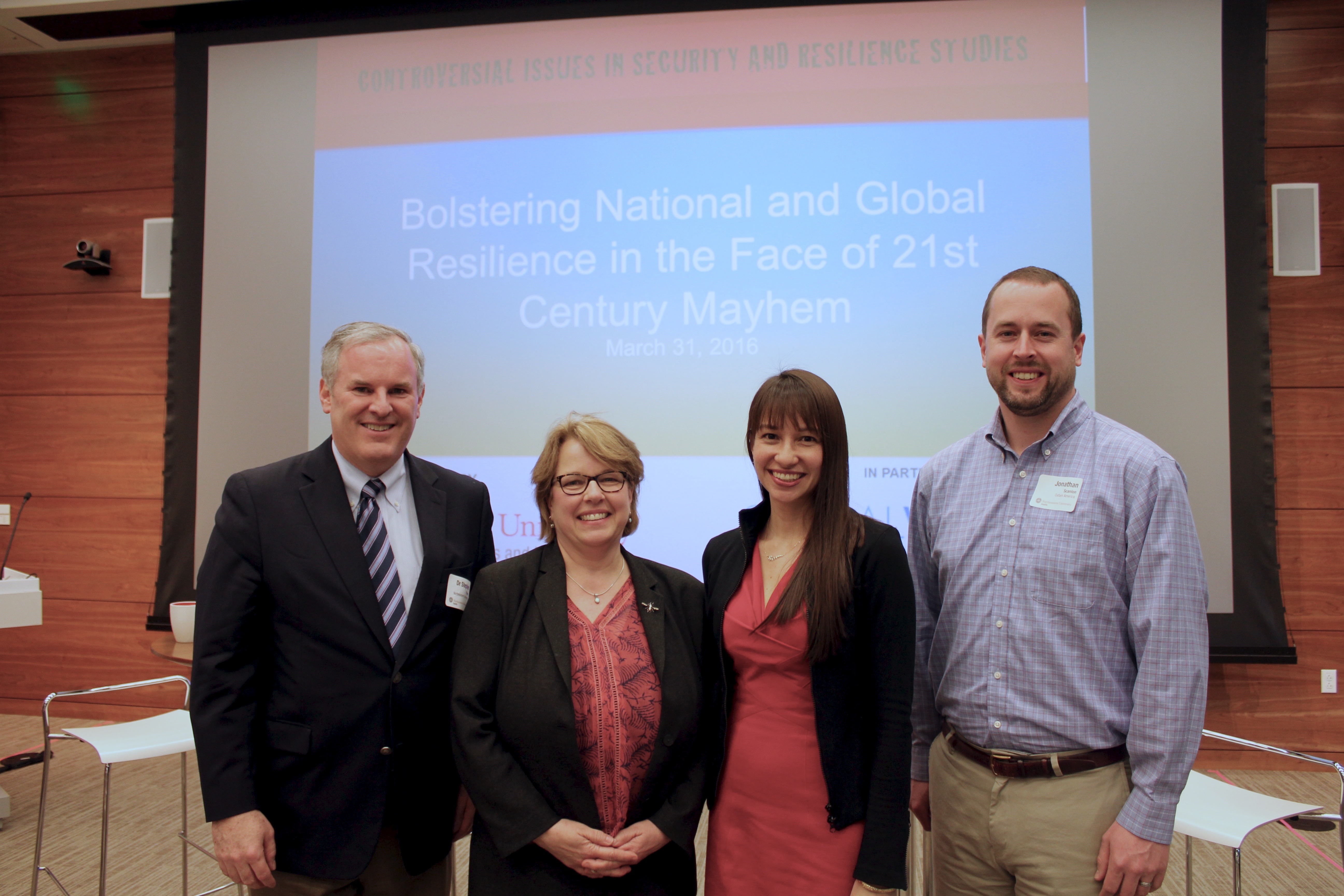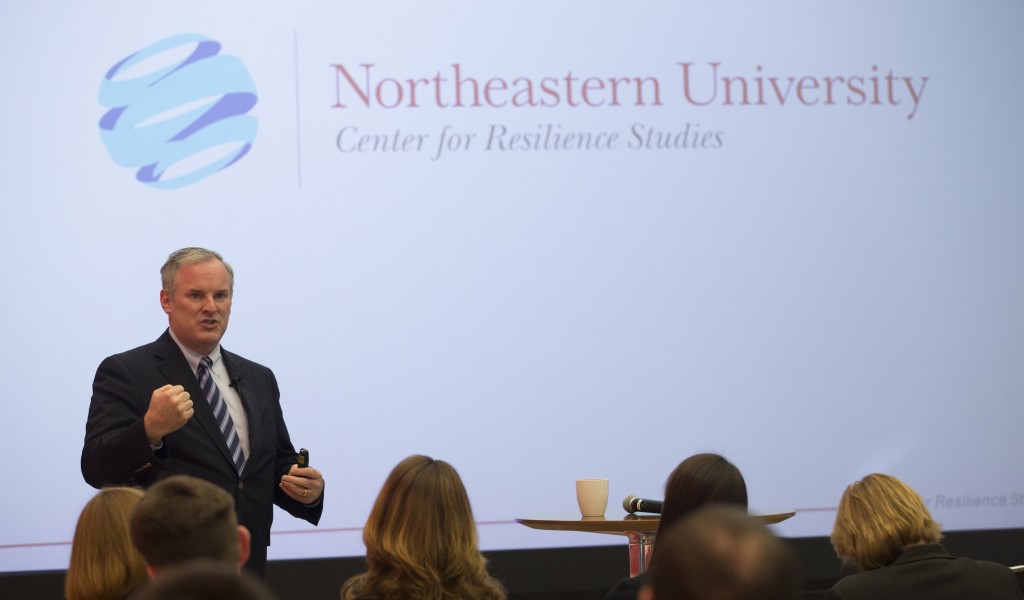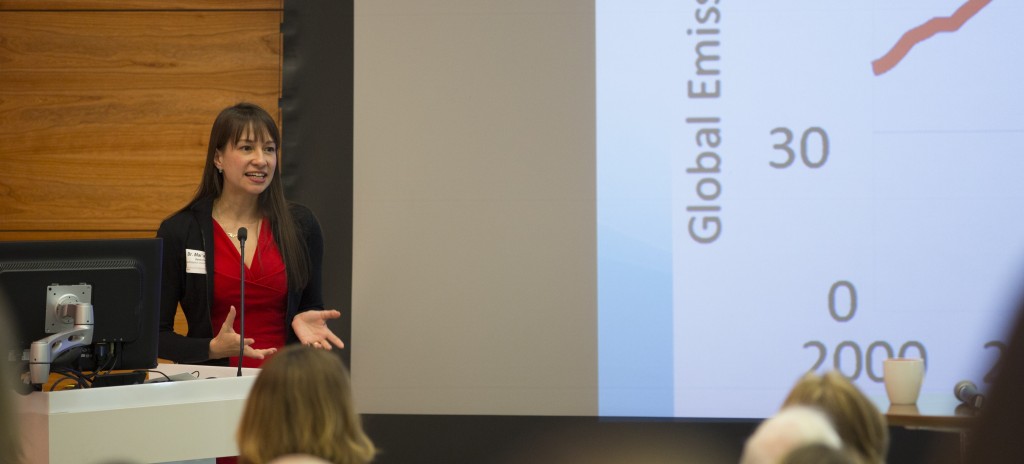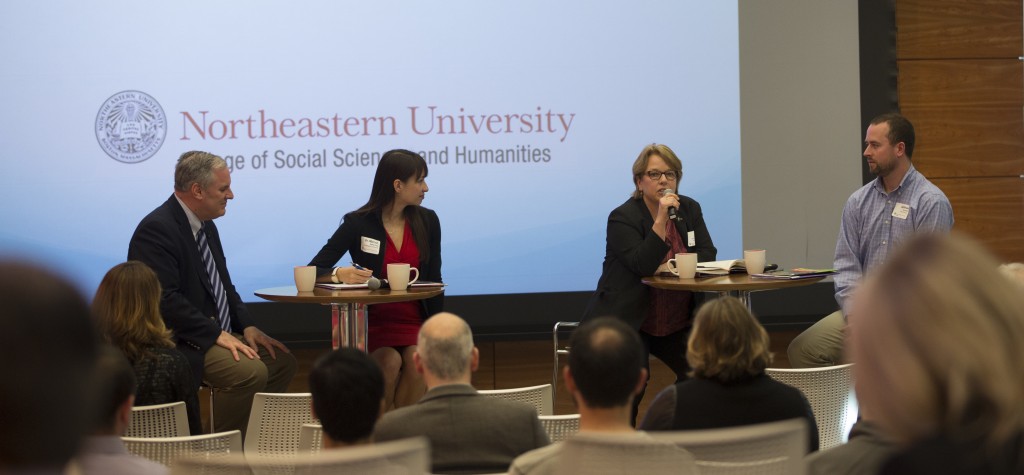Tackling controversial issues in security and resilience studies

Northeastern faculty experts and a regional panel of Pacific Northwest leaders convened Thursday for an urgent discussion on Bolstering National and Global Resilience in the Face of 21st Century Mayhem.
Two College of Social Sciences and Humanities professors led the conversation with presentations: Dr. Stephen Flynn, Director of Northeastern University’s Center for Resilience Studies, and Dr. Mai’a K. Davis Cross, Political Science and International Affairs. Joining them on the panel discussion was Ann Lesperance from Pacific Northwest National Laboratory and Jonathan Scanlon from Oxfam America.
The discussion focused on the practical and crucial steps that must be taken to build more secure and resilient communities in anticipation of the next disaster – natural or man-made. Key takeaways:
Defining Resilinece
“Issues of security and resilience are really global issues,” said Jacqueline Miller, President & CEO, World Affairs Council, kicking off the conversation.
 While many academic disciplines define resilience in different ways, Dr. Flynn said all disciplines need to be involved in building a more resilient society.
While many academic disciplines define resilience in different ways, Dr. Flynn said all disciplines need to be involved in building a more resilient society.
“Community resilience and critical infrastructure resilience are national security imperatives,” he said citing the President Policy Directive 21’s definition of resilience:
The term “resilience” means the ability to prepare for and adapt to changing conditions and withstand and recover rapidly from disruptions. Resilience includes the ability to withstand and recover from deliberate attacks, accidents, or naturally occurring threats or incidents.
Same Lessons, Different Disaster
Dr. Flynn called natural disasters a “predictive surprise.” We don’t know when, but we do know that they will happen, which means that planning can be done in advance to prepare, he said.
“Lessons are re-re-relearned,” Dr. Flynn said looking back at recent national examples, like Hurricane Sandy. “Often we make the same mistakes.”
“Resilience measures need to be incorporated into managing the risk. We must develop models and conduct simulations,” Dr. Flynn said comparing how hospitals triage for disasters with how society must implement plans. Bureaucracy between various levels of government, the public and private sectors often get in the way of progress. “Right now we have disincentives for resilience, we need to create incentives for preparation.”
Resilient Sustainability

Dr. Cross presented on the European Union’s role in supporting climate policy and the global south, outlining the missions and operations conducted under an EU flag.
Both developed and developing countries must work together to finding solutions, she said with lessons demonstrating the importance of implementing climate solutions early.
“Right now 2 million refugees from climate change,” Dr. Cross said. “If nothing changes in net 10 years, half of Europe goes from food exporters to food importers.”
“Climate change is real, climate change is happening,” said Jonathan Scanlon, Senior Advocacy Advisor, Oxfam America, citing farmers as the front line. “They may not call it ‘climate change,’ but they’ll all agree that their environments are changing.”
Local Emphasis
“If you have lived in Seattle longer than six days, you know earthquake preparedness is on our minds, but we are also very globally minded,” said Kristen Dailey, Executive Director, Global Washington. Dailey said with 1 in 5 residents of Seattle born outside of the United States, the local population is deeply invested when disasters hit in Asia and other areas around the world.
Nationally, there are a lot of unknowns and assumptions made about how communities will handle disasters, said Ann Lesperance, Director, Northwest Regional Technology Center at Pacific Northwest National Laboratory,
“All response is local. All recovery is local. It’s the local governments that are holding the problem,” she said.
Globally this is also true, Scanlon said, “the best responders are the local first responders.” With smaller disasters, Oxfam is focusing not on parachuting in responders, but putting effort into preparing local efforts.
What can be done?

In the private sector, companies often create their own planning, which may even span globally, but there isn’t coordination of these plans across organizations – both public and private. The panel agreed it has to start with having people come together at the table.
“We must build bridges between political wonks and geeks,” said Dr. Flynn, charging educational institutes with playing an important role in overcoming a technical literacy divide. At Northeastern, humanities and engineering students work together to solve problems in the Security and Resilience Studies program.
The panel concluded with a very simple action that can lead us toward becoming a more resilient community: know your neighbor.
“Identify those who may need more help and take on getting to know them and being accountable in case of emergency,” said Dr. Flynn. The biggest takeaway from these controversial discussions, is that it should makes us come together as communities.
—
The discussion was hosted by Northeastern University’s College of Social Sciences and Humanities in partnership with Global Washington and the World Affairs Council.
Interested in learning how you can be a leader in building resilient communities? The Graduate Certificate in Security & Resilience Studies is coming to Northeastern University–Seattle this Fall! The certificate program prepares students to manage contemporary transnational risks through gaining a systematic understanding of the principles and policies for enhancing the Security and Resilience of communities and critical systems.




